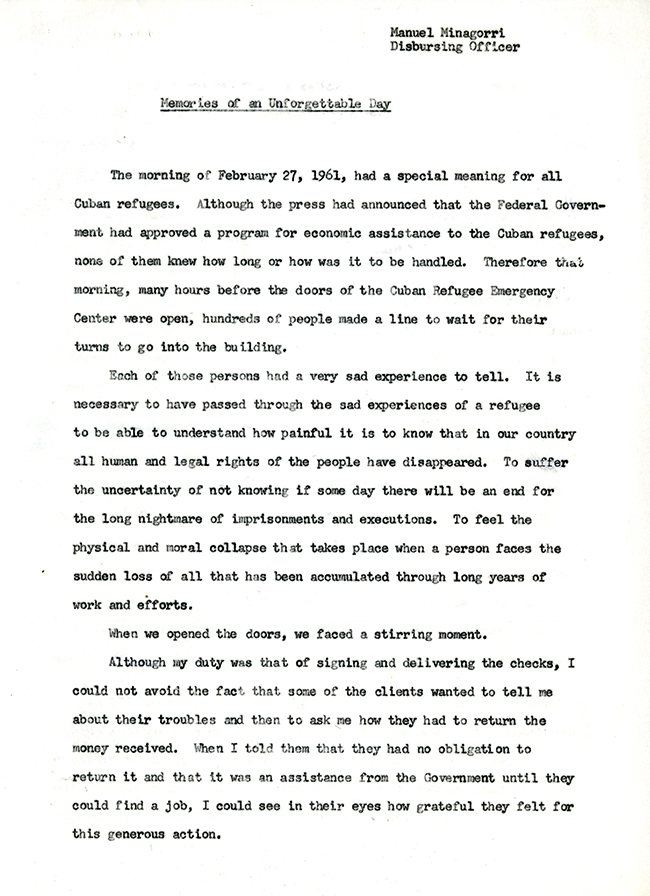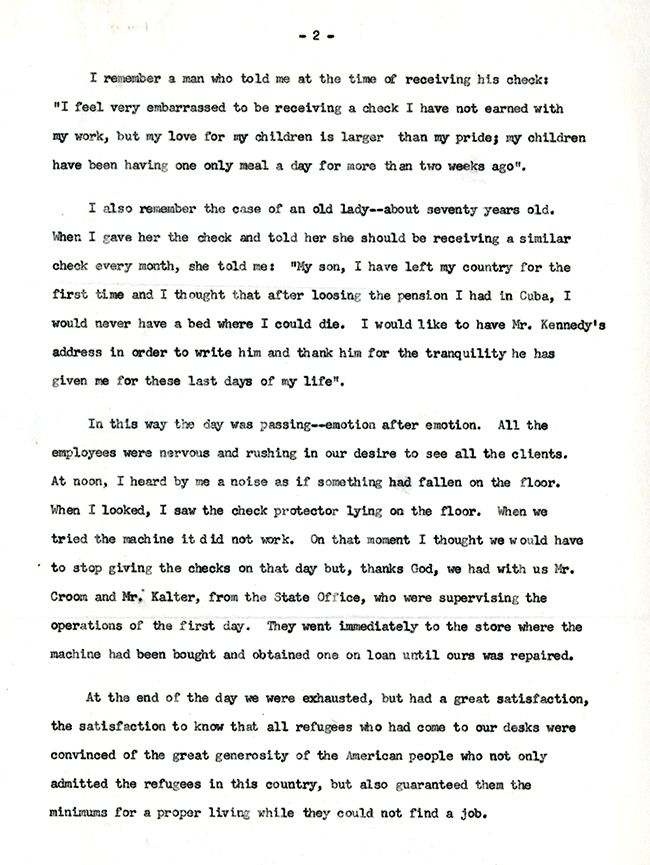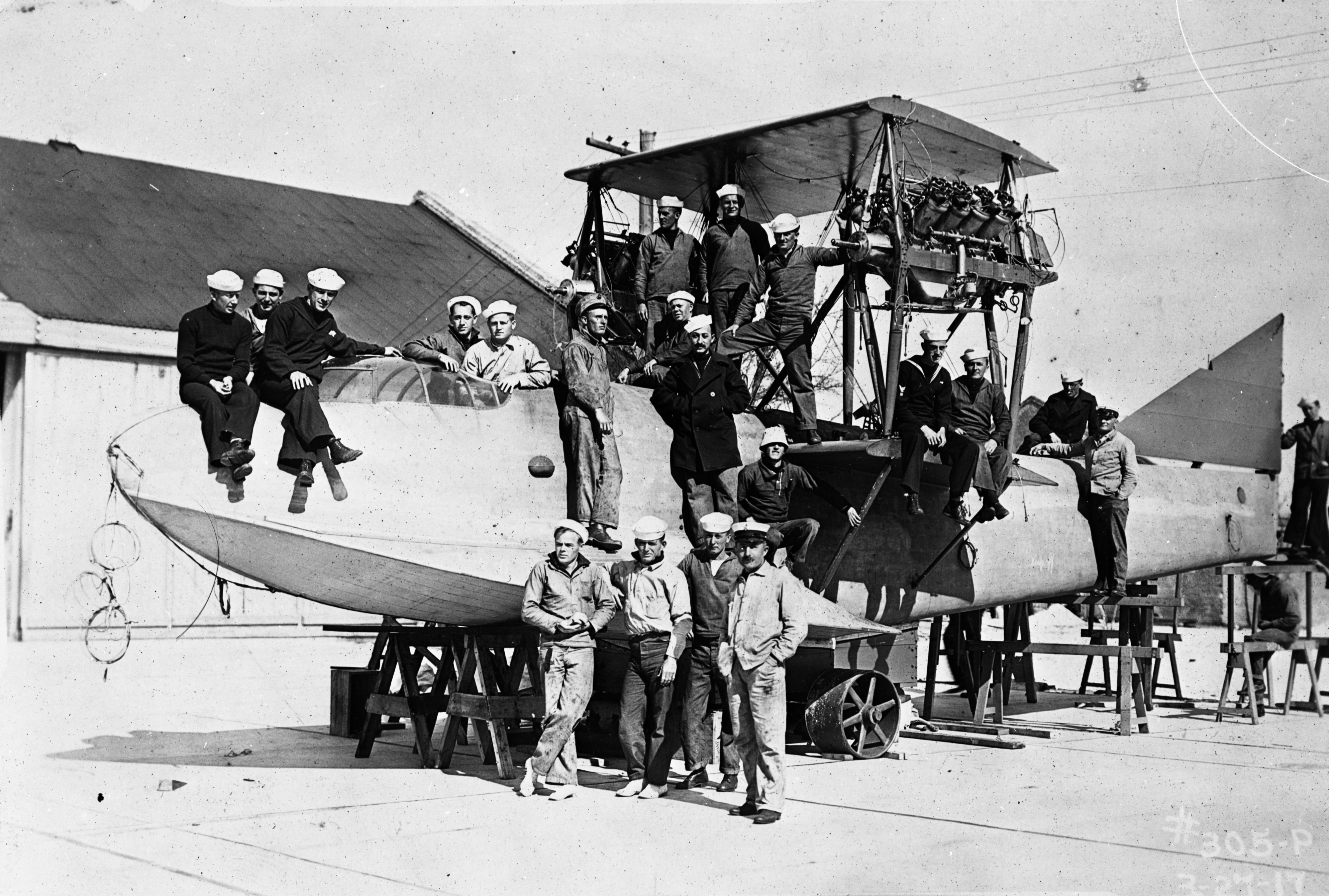The Cuban Experience in Florida: Revolution and Exodus
Manuel Minagorri to Grace H. Stewart, November 27, 1962
Letter to the Cuban Refugee Assistance Program (CRA)
Manuel Minagorri worked as a disbursing officer with the CRA. Like many CRA employees, he was a refugee himself. In this letter he responds to a request by Mrs. Fern Pence for recollections about his first day in the program. Minagorri explains the uncertainty Cuban refugees face upon arriving in the United States and the hope they receive from the CRA.
Text from letter
[Page 1]
Manuel Minagorri
Disbursing Officer
Memories of an Unforgettable Day
The morning of February 27, 1961, had a special meaning for all Cuban refugees. Although the press had announced that the Federal Government had approved a program for economic assistance to the Cuban refugees, none of them knew how long or how was it to be handled. Therefore that morning, many hours before the doors of the Cuban Refugee Emergency Center were open, hundreds of people made a line to wait for their turns to go in to the building.
Each of those persons had a very sad experience to tell. It is necessary to have passed through the sad experience of a refugee to be able to understand how painful it is to know that in our country all human and legal rights of the people have disappeared. To suffer the uncertainty of not knowing if some day there will be an end of the long nightmare of imprisonments and executions. To feel the physical and moral collapse that takes place when a person faces the sudden loss of all that has been accumulated through the long years of work and efforts.
When we opened the doors, we faced a stirring moment.
Although my duty was that of signing and delivering the checks, I could not avoid the fact that some of the clients wanted to tell me about their troubles and then to ask me how they had to return the money received. When I told them that they had no obligation to return it and that it was an assistance from the Government until they could find a job, I could see in their eyes how grateful they felt for this generous action.
Text from letter
[Page 2]
I remember a man who told me at the time of receiving his check: “I feel very embarrassed to be receiving a check I have not earned with my work, but my love for my children is larger than my pride; my children have been having one only meal a day for more than two weeks”.
I also remember the case of an old lady—about seventy years old. When I gave her the check and told her she should be receiving a similar check every month, she told me: “My son, I have left my country for the first time and I thought that after loosing [sic] the pension I had in Cuba, I would never have a bed where I could die. I would like to have Mr. Kennedy’s address in order to write him and thank him for the tranquility he has given me for these last days of my life”.
In this way the day was passing—emotion after emotion. All the employees were nervous and rushing in our desire to see all the clients. At noon, I heard by me a noise as if something had fallen on the floor. When I looked, I saw the check protector lying on the floor. When we tried the machine it did not work. On that moment I thought we would have to stop giving the checks on that day but, thanks God, we had with us Mr. Croom and Mr. Kalter, from the State Office, who were supervising the operations of the first day. They went immediately to the store where the machine had been bought and obtained one on loan until ours was repaired.
At the end of the day we were exhausted, but had a great satisfaction, the satisfaction to know that all refugees who had come to our desks were convinced of the great generosity of the American people who not only admitted the refugees in this country, but also guaranteed them the minimums for a proper living while they could find a job.

 Listen: The Bluegrass & Old-Time Program
Listen: The Bluegrass & Old-Time Program Enlarge this image
Enlarge this image


